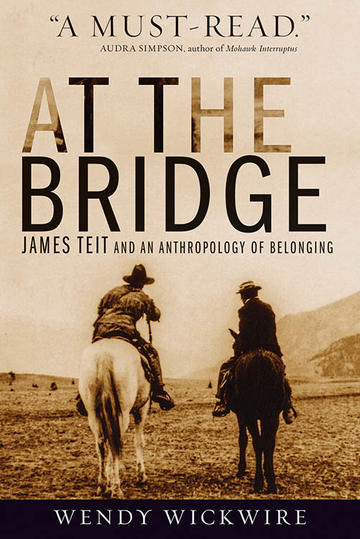About BC Books Online
BC Books Online was created for anyone interested in BC-published books, and with librarians especially in mind. We'd like to make it easy for library staff to learn about books from BC publishers - both new releases and backlist titles - so you can inform your patrons and keep your collections up to date.
Our site features print books and ebooks - both new releases and backlist titles - all of which are available to order through regular trade channels. Browse our subject categories to find books of interest or create and export lists by category to cross-reference with your library's current collection.
A quick tip: When reviewing the "Browse by Category" listings, please note that these are based on standardized BISAC Subject Codes supplied by the books' publishers. You will find additional selections, grouped by theme or region, in our "BC Reading Lists."
At the Bridge chronicles the little-known story of James Teit, a prolific ethnographer who, from 1884 to 1922, worked with and advocated for the Indigenous peoples of British Columbia and the northwestern United States. From his base at Spences Bridge, BC, Teit forged a participant-based anthropology that was far ahead of its time. Whereas his contemporaries, including famed anthropologist Franz Boas, studied Indigenous peoples as members of “dying cultures,” Teit worked with them as members of living cultures resisting colonial influence over their lives and lands. Whether recording stories, mapping place-names, or participating in the chiefs’ fight for fair treatment, he made their objectives his own. With his allies, he produced copious, meticulous records; an army of anthropologists could not have achieved a fraction of what he achieved in his short life. Wickwire’s beautifully crafted narrative accords Teit the status he deserves, consolidating his place as a leading and innovative anthropologist in his own right.
Wendy Wickwire is professor emerita in the Department of History at the University of Victoria. Her publications include Stein: The Way of the River (with Michael M’Gonigle), which won the Bill Duthie Booksellers’ Choice Award at the BC Book Awards; Nature Power: In the Spirit of an Okanagan Storyteller (with Harry Robinson), which won the Roderick Haig-Brown Prize for best regional book at the BC Book Awards; Write It On Your Heart: The Epic World of an Okanagan Storyteller (with Harry Robinson), which was shortlisted for the Roderick Haig-Brown Prize; and Living by Stories: A Journey of Landscape and Memory (with Harry Robinson). For more information, visit www.wendywickwire.com.
- Short-listed, Roderick Haig-Brown Award, BC and Yukon Book Prizes
- Winner, Clio BC, Canadian Historical Association
- Short-listed, Ryga Award for Best Book on Social Justice Awareness in Literature, The George Ryga Society
- Winner, Canada Prize in the Humanities and Social Sciences, Federation for the Humanities and Social Sciences
- Commended, The Wilson Book Prize, McMaster University
- Winner, Best Book in Canadian Studies, The Canadian Studies Network
- Short-listed, Best Scholarly Book in Canadian History, Canadian Historical Association
- Winner, Labrecque-Lee Book Award, Canadian Anthropology Society
- Short-listed, Basil Stuart-Stubbs Prize, UBC Library
- Short-listed, Lieutenant Governor's Medal for Historical Writing, BC Historical Federation
Wendy Wickwire’s groundbreaking historical investigation places James Teit as a key figure in early North American anthropology, but also as central to historical Indigenous rights activism in British Columbia.
Wickwire painstakingly unearths the life and legacy of someone who was undeservedly 'invisibilized'...she does a thorough job of unearthing Teit’s legacy. Her book is filled with detail, anecdotes, and personal reflection. It’s an inspiring must-read for anyone interested in reconciliation today.
Wickwire has done B.C. scholars and Indigenous peoples an essential service in deftly peeling back the layers of personality, family, and life circumstances of one of Canada’s unsung heroes ... [her] work is not only highly recommended, but a definite must-read for anyone concerned with the unresolved Indigenous “land question” that continues to haunt the province to this day.
"Wickwire painstakingly unearths the life and legacy of someone who was undeservedly 'invisibilized'...she does a thorough job of unearthing Teit’s legacy. Her book is filled with detail, anecdotes, and personal reflection. It’s an inspiring must-read for anyone interested in reconciliation today."
It is an exceptional book about a remarkable man who never received the recognition he deserved for his major input to what was then the new science of anthropology.
Wickwire draws her audience into a style of anthropology that is situated, participatory, and strives to be contextually self-aware at every turn.
It is a remarkable book about a remarkable man and deserves a place on the bookshelf of everyone who understands that knowing where we’ve come from is essential to navigating our course to somewhere else and to somewhere that we hope to make better rather than worse.
When Wickwire talks about Teit, there is an obvious excitement at the chance to highlight such an interesting character. That excitement comes across on the pages of the book as lively, solid reportage with a healthy dash of deserved reverence. At the Bridge is dense without being dry.



